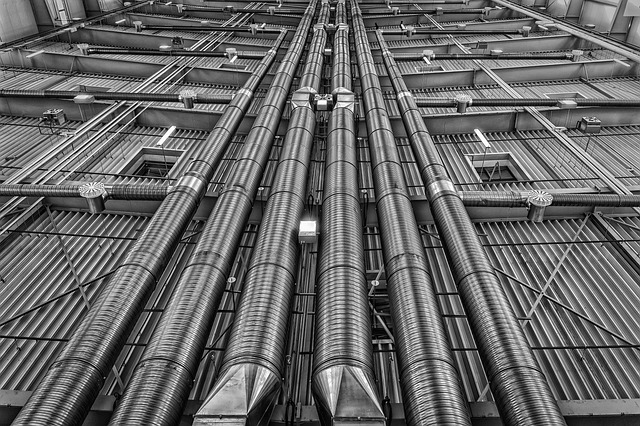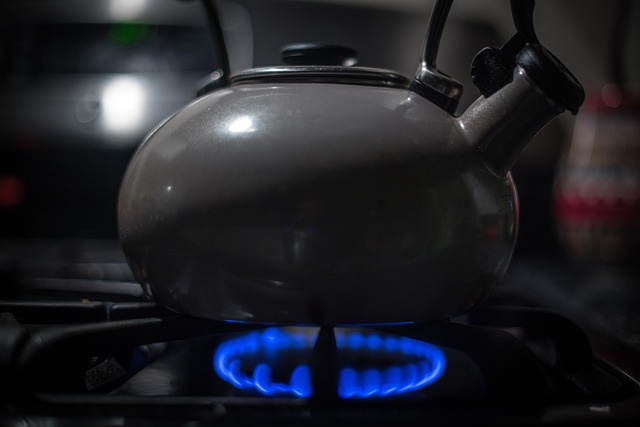Gas water heaters convert fuel energy to hot water via key components like combustion chambers and heat exchangers. Modern innovations, such as tankless systems, enhance efficiency by providing on-demand hot water. Heat Recovery Efficiency technology recaptures wasted heat, improving performance and reducing utility costs. Condensing gas heaters, with efficient heat exchangers and insulation, maximize energy utilization, reduce environmental impact, and promote residential energy conservation.
A gas water heater is a common household appliance, but what if there was a way to make it even more efficient? Condensing gas water heaters offer an innovative solution by maximizing heat recovery, extracting additional energy from the exhaust gases. This article delves into the fundamentals of gas water heaters, explores the concept of heat recovery efficiency, and provides insights on components, installation, maintenance, and energy savings. By understanding these aspects, homeowners can make informed decisions to enhance their plumbing system’s performance and contribute to environmental sustainability.
- Understanding Gas Water Heater Basics
- Heat Recovery Efficiency: The Concept
- Components for Condensing System Optimization
- Installation and Maintenance Tips
- Energy Savings and Environmental Impact
Understanding Gas Water Heater Basics

A gas water heater is a common fixture in many homes, providing hot water for various daily tasks. At its core, it’s a device that uses the energy from burning fuel, typically natural gas or propane, to heat and store water. The fundamental components include a combustion chamber, a heat exchanger, and a storage tank (in tank water heaters). When you turn on a tap or shower, hot water is circulated through pipes, ensuring a continuous supply of warm water for your home’s residential water heating needs.
These systems have evolved over time, with advancements in gas water heating technology leading to improved energy efficiency and better heat recovery capabilities. Modern options like tankless gas systems offer on-demand hot water, eliminating the need for a storage tank. This not only conserves space but also enhances energy efficiency by reducing standby heat loss. In terms of residential water heating, understanding these basics is crucial when considering how to maximize heat recovery and overall system performance.
Heat Recovery Efficiency: The Concept

Heat Recovery Efficiency, a revolutionary concept in gas water heater technology, focuses on maximizing energy utilization by recapturing heat that would otherwise be lost during the heating process. This innovative approach significantly enhances residential water heating efficiency, reducing energy consumption and utility bills. By integrating advanced recovery systems, gas water heaters can recover heat from exhaust gases and use it to preheat incoming cold water, thus minimizing the amount of energy required to heat the water to the desired temperature.
This efficient method not only applies to traditional tank water heaters but also extends to tankless gas systems, offering a more sustainable and cost-effective solution for home water heating. The concept behind Heat Recovery Efficiency ensures that every unit of energy input results in maximum hot water output, making it a game-changer in the world of energy-efficient heating, especially with the growing demand for natural gas heaters and propane water heaters.
Components for Condensing System Optimization

The optimization of a condensing system in a gas water heater involves several key components working in harmony to maximize heat recovery efficiency. Firstly, the heat exchanger plays a crucial role by transferring the condensate’s thermal energy back into the incoming cold water, significantly boosting the overall heating process. This is particularly beneficial for gas water heaters and natural gas heaters, as it reduces the amount of heat lost during the condensation phase.
Additionally, efficient insulation around the tank and pipes prevents heat dissipation, ensuring that more warmth is retained within the system. These measures are essential for enhancing the performance of tank water heaters and tankless gas systems, contributing to better energy utilization in residential water heating. By incorporating these components, gas fired heaters and hot water systems can achieve improved energy-efficient heating, thereby reducing overall energy consumption and operational costs.
Installation and Maintenance Tips

When installing a condensing gas water heater, proper placement and ventilation are crucial for optimal performance. Ensure it’s located in a well-ventilated area to facilitate efficient combustion and maximize heat recovery. Regular maintenance is equally vital; cleaning or replacing filters and flue obstructions can significantly enhance the energy efficiency of your natural gas heaters or propane water heaters.
For tankless gas systems, periodic inspections are essential to check for any leaks or corrosion. These measures ensure not only the longevity of your hot water systems but also contribute to overall energy conservation in residential water heating. By maintaining your gas fired heaters, you can promote efficient heat transfer, thereby reducing energy costs and environmental impact, while providing reliable hot water for various applications across home water heating.
Energy Savings and Environmental Impact

The energy savings potential of condensing gas water heaters is significant. These advanced systems capture and utilize heat that would otherwise be lost during the evaporation process, significantly boosting efficiency compared to traditional tank water heaters. By effectively recovering and repurposing exhaust gases, condensing heaters can reduce energy consumption by up to 30%, leading to substantial cost savings for homeowners. This increased efficiency translates into lower utility bills and a smaller carbon footprint—a win-win for both wallets and the environment.
The environmental impact of these systems extends beyond individual homes. By promoting energy efficiency in residential water heating, condensing gas heaters contribute to a broader shift towards sustainable practices. The reduction in natural gas consumption, as well as decreased demand for propane water heaters, can lead to lower greenhouse gas emissions and reduced strain on finite resources. This not only benefits the planet but also ensures a more secure and environmentally friendly future for residential hot water systems and energy-efficient heating overall.
Condensing gas water heaters offer a promising path toward maximizing heat recovery efficiency, significantly reducing energy consumption, and minimizing environmental impact. By harnessing the power of advanced technology, these heaters not only provide hot water but also contribute to a more sustainable future. Understanding the basic principles, optimizing components, and adhering to installation and maintenance tips can help maximize their potential benefits. Embrace the transition to condensing gas water heaters for both cost savings and ecological stewardship.
